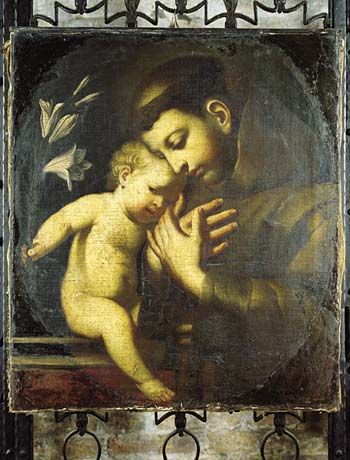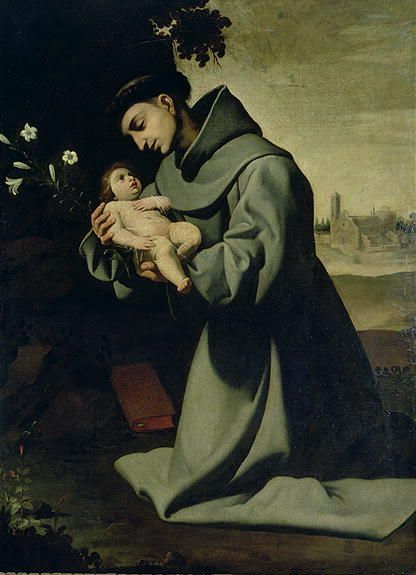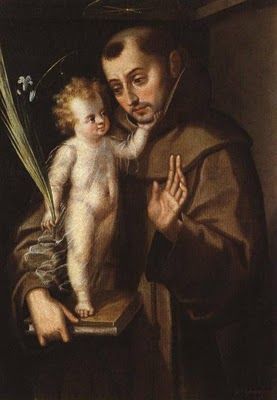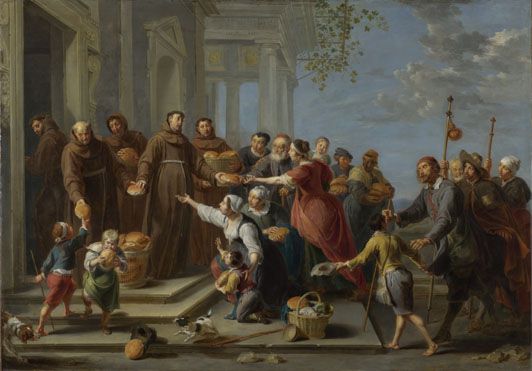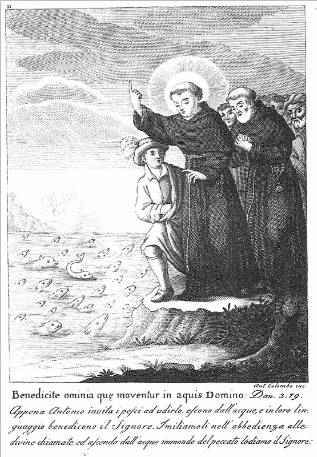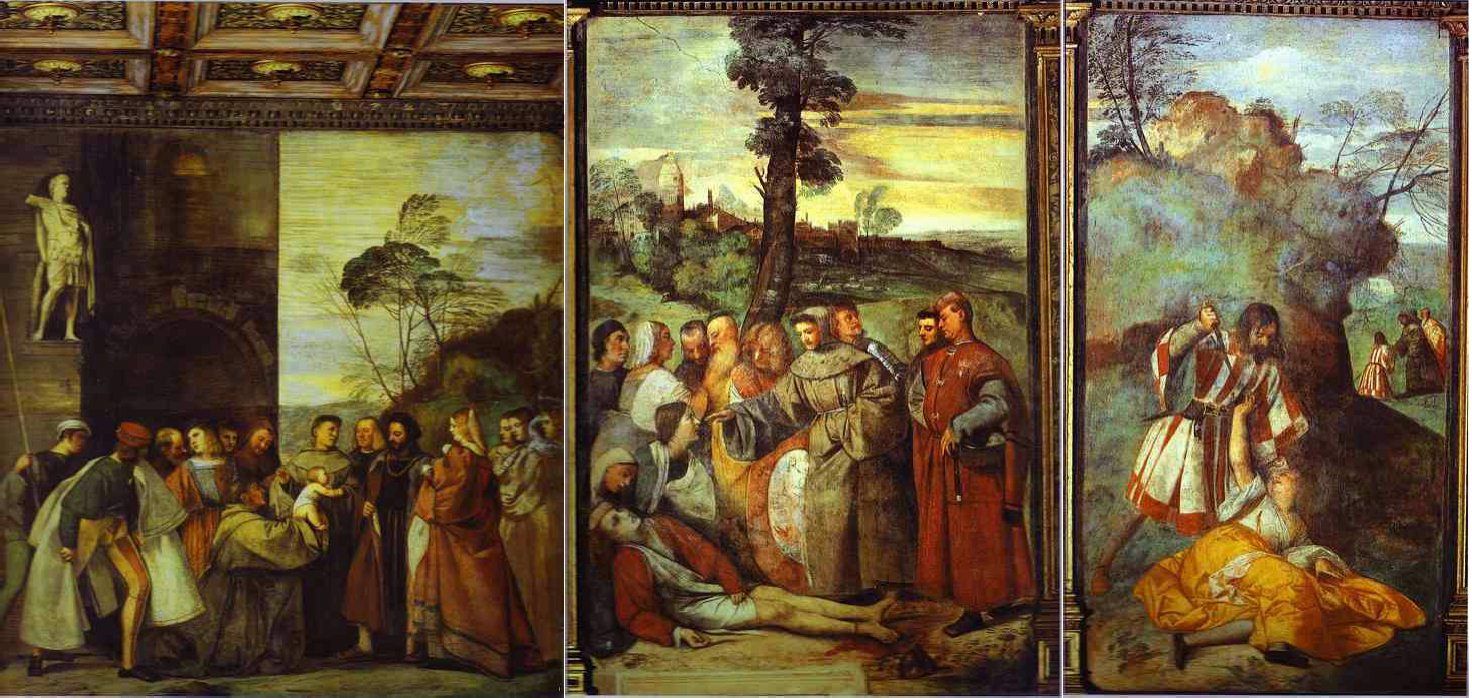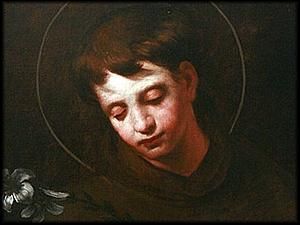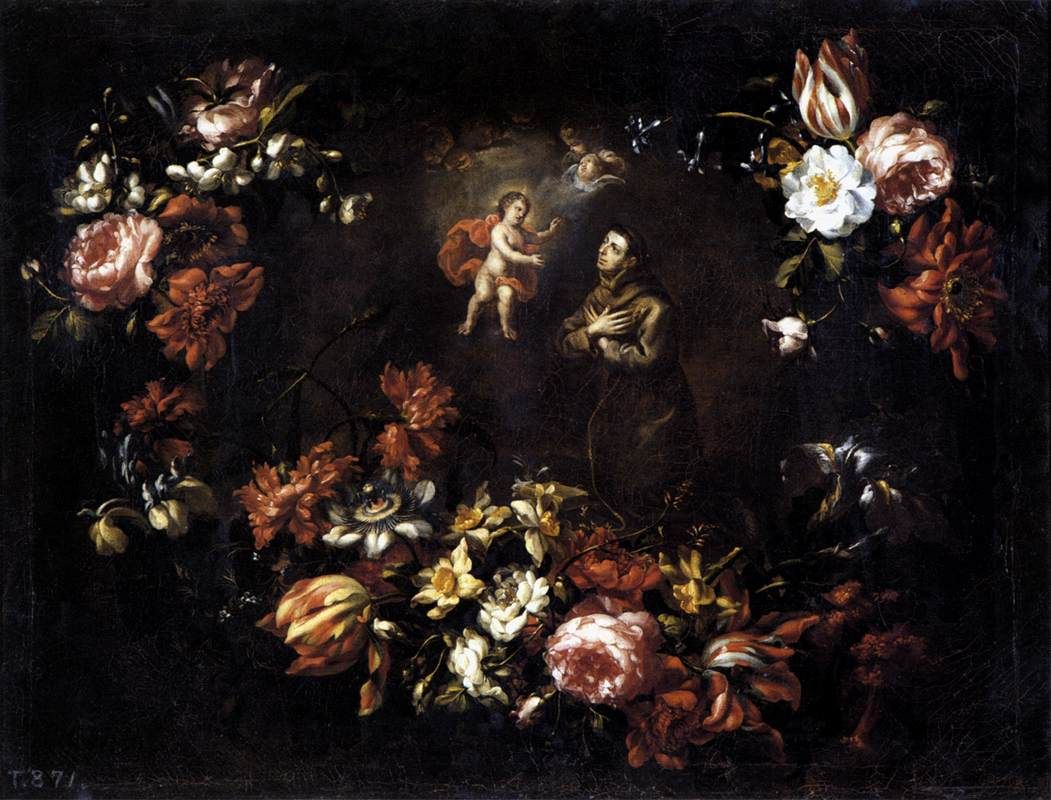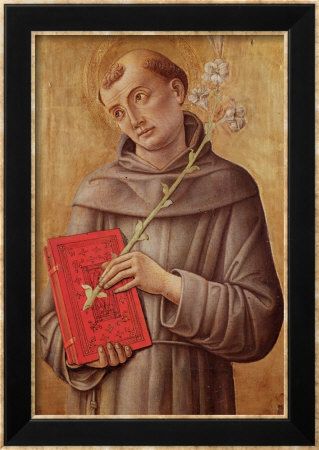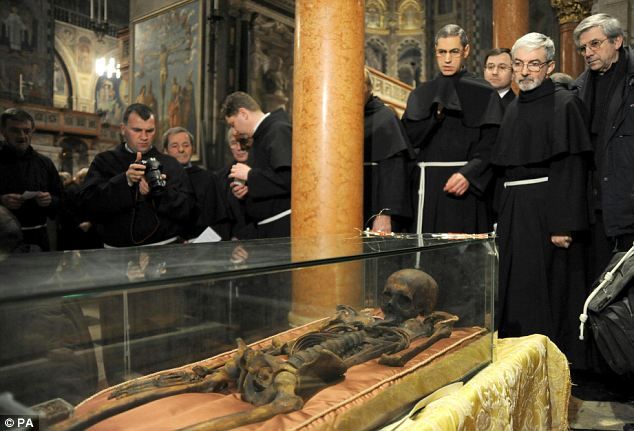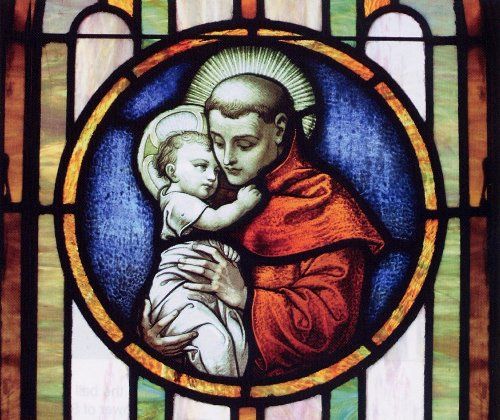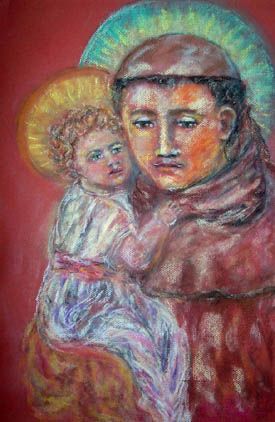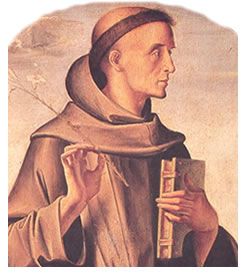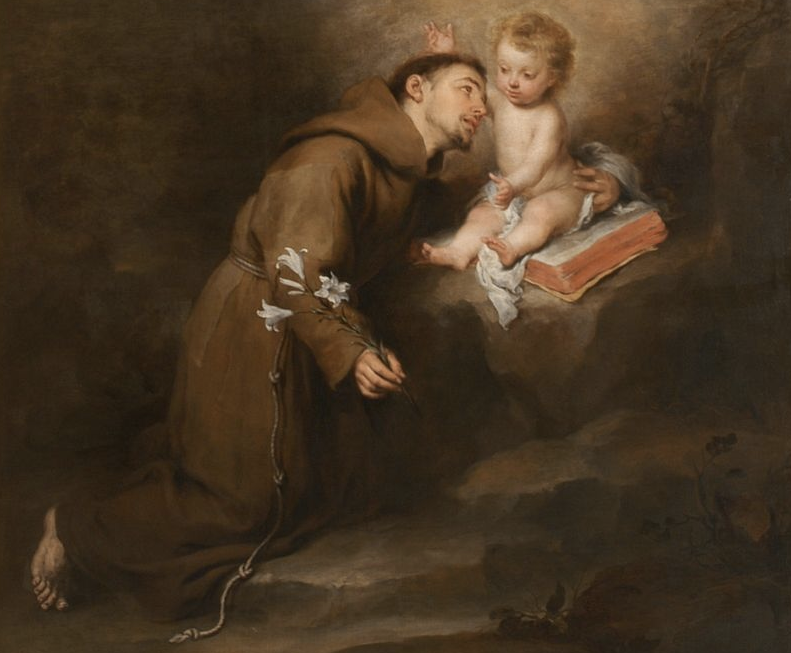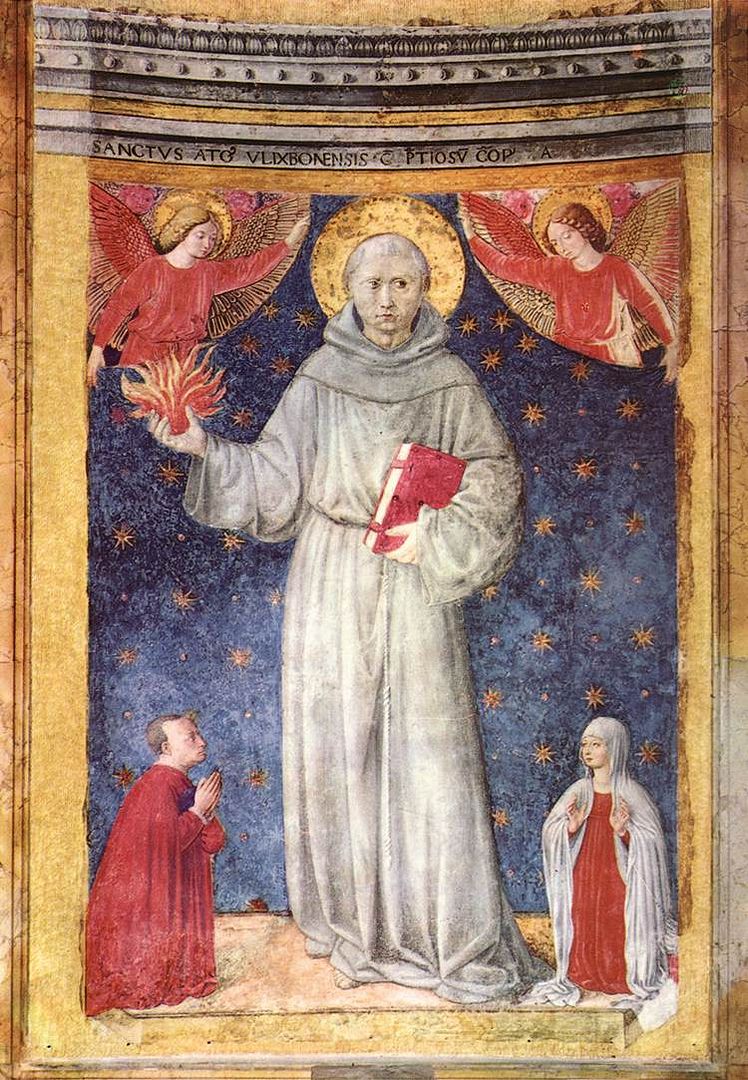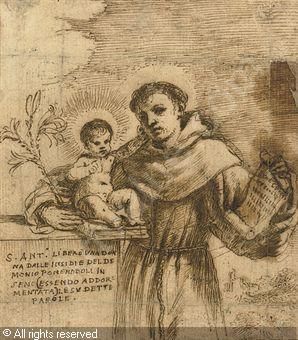
Sunday 4 November 2012
Monday 1 October 2012
Feast of the Guardian Angels

Angel of God, My Guardian Dear,
To Whom God's Love Entrusts Me Here,
Ever This Day, Be At My Side
To Light and Guard, To Rule and Guide.
Amen.
Belief in the reality of angels, their mission as messengers of God, and man’s interaction with them, goes back to the earliest times. Cherubim kept Adamand Eve from slipping back into Eden; angels saved Lot and helped destroy the cities of the plains; in Exodous Moses follows an angel, and at one point an angel is appointed leader of Israel. Michael is mentioned at several points,Raphael figures large in the story of Tobit, and Gabriel delivered theAnnunciation of the coming of Christ.
The concept of each soul having a personal guardian angel, is also an ancient one, and long accepted by the Church
See that you despise not one of these little ones [children]: for I say to you, that their angels in heaven always see the face of my Father who is in heaven. - Jesus, Matthew 18:10
How great the dignity of the soul, since each one has from his birth an angelcommissioned to guard it. - Saint Jerome in his commentary on Matthew
Are they not all ministering spirits, sent to minister for them, who shall receive the inheritance of salvation? - Hebrews 1:14
The concept of each soul having a personal guardian angel, is also an ancient one, and long accepted by the Church
See that you despise not one of these little ones [children]: for I say to you, that their angels in heaven always see the face of my Father who is in heaven. - Jesus, Matthew 18:10
How great the dignity of the soul, since each one has from his birth an angelcommissioned to guard it. - Saint Jerome in his commentary on Matthew
Are they not all ministering spirits, sent to minister for them, who shall receive the inheritance of salvation? - Hebrews 1:14
Thursday 20 September 2012
SAINT MATTHEW Apostle († First Century)

One day, as Our Lord was walking by the Sea of Galilee, He saw, seated in his customs bureau, Levi the publican, whose business it was to collect the taxes from the people for their Roman masters. Jesus said to him: “Follow Me.” Leaving all behind, Matthew arose and did so, thereby giving us all an example of the way in which we should respond to grace. The humble Matthew, as he was thereafter called, tells us himself in his Gospel that he was Levi, one of those publicans abhorred by the Jews as enemies of their country, outcasts and notorious sinners, who enriched themselves by extortion and fraud. No Pharisee would sit with one at table; Our Saviour alone had compassion for them.
Saint Matthew prepared a great feast, to which he invited Jesus and His disciples, with a number of these publicans, who thereupon began to listen to Him with attention and joy. It was there, in answer to the murmurs of the Pharisees saying that this “pretended prophet” ate with publicans and sinners, that Jesus said, “They that are in good health have no need of a physician. I have not come to call the just, but sinners to penance.”
After the Ascension, Saint Matthew remained for over ten years in Judea, writing his Gospel there in about the year 44, to teach his countrymen that the kingdom of heaven had already been instigated, for Jesus was their true Lord and the King foretold by the prophets. He departed then to preach the Faith in Egypt and especially in Ethiopia, where he remained for twenty-three years. When he resurrected the son of the Ethiopian king who had received him, the miracle brought about the conversion of the royal house and with them the entire province.
The king’s daughter consecrated herself to God with several other maidens. When a young man wished to marry the beautiful Iphigenia, Saint Matthew invited him to come and listen to a discourse he was to make to that community of virgins, to hear what he would say to them. When the Apostle extolled the state of virginity, the suitor became enraged and arranged to have him slain as he came from the altar. Saint Hippolyte calls Saint Matthew the victim and martyr of holy virginity.
It is said in the Constitutions of Pope Saint Clement that Saint Matthew instituted holy water, for protection of soul and body; the prayer he used for the purpose is reported in that document. The relics of Saint Matthew were for many years in the city of Naddaver in Ethiopia, where he suffered his martyrdom, but were transferred to Salerno in the year 954, where they remained concealed in a cave, for protection, for over a hundred years.
Friday 17 August 2012
August 18: Saint Helena of Constantinople
 Today, August 18, we celebrate the feast day of Saint Helena of Constantinople (also known as Saint Helen, Eleanor, and Olga, 246-330), mother of Constantine the Great, and finder of the True Cross of Jesus. Despite being elevated to empress of the Roman Empire during her life, she worked tirelessly for the poor, released prisoners, and humbly mingled with the ordinary worshipers in modest attire. Throughout her life, Helena built magnificent churches throughout the Holy Land, spreading the Gospel of Christ, and bringing many to the faith through her witness.
Today, August 18, we celebrate the feast day of Saint Helena of Constantinople (also known as Saint Helen, Eleanor, and Olga, 246-330), mother of Constantine the Great, and finder of the True Cross of Jesus. Despite being elevated to empress of the Roman Empire during her life, she worked tirelessly for the poor, released prisoners, and humbly mingled with the ordinary worshipers in modest attire. Throughout her life, Helena built magnificent churches throughout the Holy Land, spreading the Gospel of Christ, and bringing many to the faith through her witness.
Born in Bithynia, the daughter of a humble innkeeper, Helena rose above her humble beginnings after marrying the Roman General Constantius I Chlorus. Following the birth of their son, Constantine, Helena’s husband was elevated to junior emperor and proclaimed Caesar. He promptly divorced Helena and took a new wife. Years later, in 312, Constantine became emperor (renamed Caesar) following a decisive victory in battle during which his father was killed, and his mother, Helena, named empress (renamed Helena Augusta).
Helena converted to Christianity, and through her witness, the emperor made Faith in Christ the official religion of the Roman Empire. As Eusebius wrote, Helena was: "such a devout servant of God, that one might believe her to have been from her very childhood a disciple of the Redeemer of mankind.” Helena spent her days in acts of charity, and built many churches on the holy sites of the faith, oftentimes tearing down pagan temples that had been built on the sites. In the year 325, Helena was moved to undertake a pilgrimage to the Holy Land, as she had been called by God to search out the True Cross on which Jesus had been crucified. Elderly by this time, she undertook the hardships of the journey without complaint.
Upon reaching Golgotha, the holy place where Christ was crucified, Helena had the temple of Aphrodite (built by Emperor Hadrian to defile the place of the Passion) torn down, and the hill excavated. During excavation, three crosses were found buried in the earth—one for each thief crucified beside Jesus, and the True Cross upon which He gave His life for the world. Gazing upon the crosses, Helena was unsure of which might be the wood of salvation. A woman from Jerusalem, who was near certain death from a disease she had contracted, was brought to Golgotha and made to touch each of the crosses. As soon as she approached the Cross of Our Lord, she was cured. The Cross itself was venerated and placed in a magnificent church (Church of the Holy Sepulchre) built by Saint Helen in Jerusalem, although she took a small portion back to Constantinople with her as a blessing. Within fifteen years, Saint Cyril, the bishop of Jerusalem, reported the wide spread distribution of the True Cross as a relic: "The holy wood of the cross gives witness: it is here to be seen in this very day, and through these who take [pieces] from it in faith, it has from here already filled almost the whole world."
Legend also suggests that Saint Helena recovered other relics of Christ, including the tunic He wore prior to the crucifixion, and the nails and rope used to affix Him to the Cross. Some of these relics are on display, even today, in the private chapel of her palace in Rome (now converted to the Basilica of the Holy Cross in Jerusalem), while others are housed at the Staurovouni monastery, which she founded.
Following her miraculous discoveries, Saint Helena resolved to spread the devotion to Christ throughout the region. It was in Palestine, as we learn from Eusebius, that she had resolved to bring to God, the King of kings, the homage and tribute of her devotion. She lavished on that land her bounties and good deeds, she "explored it with remarkable discernment,” and "visited it with the care and solicitude of the emperor himself.”Then, when she "had shown due veneration to the footsteps of the Savior,” she had two churches erected for the worship of God: one was raised in Bethlehem near the Grotto of the Nativity, the other on the Mount of Olives, where Jesus ascended into heaven, near Jerusalem. She also embellished the sacred grotto with rich ornaments. Further churches were raised marking the sites of the Resurrection and Crucifixion.
Saint Helena passed into heaven at the advanced age of eighty. Her body was brought to Constantinople and laid to rest in the imperial vault of the church of the Apostles. It is presumed that her remains were transferred in 849 to the Abbey of Hautvillers, in the French Archdiocese of Reims, as recorded by the monk Altmann in his "Translatio.” Her sarcophagus is on display in the Pio-Clementine Vatican Museum.
PRAYER
 Holy and blessed Saint Helena, with the anguish and devotion with which you sought the Cross of Christ, I plead that you give me God's grace to suffer in patience the labors of this life, so that through them and through your intercession and protection, I will be able to seek and carry the Cross, which God has placed upon me, so that I can serve Him in this life and enjoy His Glory ever after. Amen.
Holy and blessed Saint Helena, with the anguish and devotion with which you sought the Cross of Christ, I plead that you give me God's grace to suffer in patience the labors of this life, so that through them and through your intercession and protection, I will be able to seek and carry the Cross, which God has placed upon me, so that I can serve Him in this life and enjoy His Glory ever after. Amen.Friday 27 July 2012
Saints Joachim and Anna
St. Joachim was of the tribe of Judah, and a descendant of King David. Anna was the daughter of Matthan the priest, of the tribe of Levi as was Aaron the High Priest. Matthan had three daughters: Mary, Zoia and Anna. Mary was married in Bethlehem and bore Salome; Zoia was also married in Bethlehem and bore Elisabeth, the mother of St. John the Forerunner; and Anna was married in Nazareth to Joachim, and in old age gave birth to Mary, the most holy Mother of God. Joachim and Anna had been married for fifty years, and were barren. They lived devoutly and quietly, using only a third of their income for themselves and giving a third to the poor and a third to the Temple, and they were well provided for. Once, when they were already old and were in Jerusalem to offer sacrifice to God, the High Priest, Issachar, upbraided Joachim, "You are not worthy to offer sacrifice with those childless hands." Others who had children jostled Joachim, thrusting him back as unworthy. This caused great grief to the two aged souls, and they went home with very heavy hearts. Then the two of them gave themselves to prayer to God that He would work in them the wonder that He had worked in Abraham and Sarah, and give them a child to comfort their old age. God sent them His angel, who gave them tidings of the birth of "a daughter most blessed, by whom all the nations of the earth will be blessed, and through whom will come the salvation of the world." Anna conceived at once, and in the ninth month gave birth to the holy Virgin Mary. St. Joachim lived for eighty years and Anna for seventy-nine, and they both entered into the kingdom of God.
Wednesday 18 July 2012
Vincent de Paul

In 1605, on a voyage by sea from Marseilles to Narbonne, he fell into the hands of African pirates and was carried as a slave to Tunis. His captivity lasted about two years, until Divine Providence enabled him to effect his escape. After a brief visit to Rome he returned to France, where he became preceptor in the family of Emmanuel de Gondy, Count of Goigny, and General of the galleys of France. In 1617, he began to preach missions, and in 1625, he lay the foundations of a congregation which afterward became the Congregation of the Mission or Lazarists, so named on account of the Prioryof St. Lazarus, which the Fathers began to occupy in 1633.
It would be impossible to enumerate all the works of this servant of God. Charity was his predominant virtue. It extended to all classes of persons, from forsaken childhood to old age. The Sisters of Charity also owe the foundation of their congregation to St. Vincent. In the midst of the most distracting occupations his soul was always intimately united with God. Though honored by the great ones of the world, he remained deeply rooted in humility. The Apostle of Charity, the immortal Vincent de Paul, breathed his last in Paris at the age of eighty. His feast day is September 27th. He is the patron of charitable societies.
Saturday 7 July 2012
Saint Elizabeth
Queen Saint of Portugal
Queen Saint of Portugal

1271-1336
Also known as: The Peacemaker; Isabel of Portugal; Isabella of Portugal
Memorial: 4 July; formerly 8 July
 Princess Elizabeth was born in 1271 at Aragon, Spain. She was the daughter of King Pedro III of Aragon and Constantia, great-granddaughter of Emperor Frederick II. When she was twelve, she was given in marriage to Dennis, King of Portugal and thus Queen of Portugal before she was a teenager. Even though her husband was unfaithful, she prayed that he would have a change of heart. Elizabeth became a saintly wife. She heard Mass and recited the Divine Office daily, but her devotions were arranged with such prudence that they interfered with none of her duties of state. Elizabeth gave her King two children, a daughter, Constance, who married Ferdinand IV of Castile, and a son Afonso (later Afonso IV of Portugal).
Princess Elizabeth was born in 1271 at Aragon, Spain. She was the daughter of King Pedro III of Aragon and Constantia, great-granddaughter of Emperor Frederick II. When she was twelve, she was given in marriage to Dennis, King of Portugal and thus Queen of Portugal before she was a teenager. Even though her husband was unfaithful, she prayed that he would have a change of heart. Elizabeth became a saintly wife. She heard Mass and recited the Divine Office daily, but her devotions were arranged with such prudence that they interfered with none of her duties of state. Elizabeth gave her King two children, a daughter, Constance, who married Ferdinand IV of Castile, and a son Afonso (later Afonso IV of Portugal).
Like her great-aunt Saint Elizabeth of Hungary, for whom she was named, Saint Elizabeth of Portugal dedicated her life to the poor. Her charitable works were outstanding. She founded institutions for the sick, for travelers, for wayward women, for abandoned infants. She established a convent for nuns and provided dowries for poor brides. This gentle woman was also a peacemaker between members of her own family and between nations. Elizabeth managed to end a long standing feud between her husband and her son and managed to bring about a change in her husband's disposition before his death in 1324.
Her husband Dennis died in 1325. Elizabeth then retired to a convent of Poor Clares, which she had founded at Coimbra. She took the Franciscan Tertiary habit, wishing to devote the rest of her life to the poor and sick in obscurity.
Elizabeth lived eleven more years and died on July 4, 1336. She died at the age of sixty-five, while in the act of making peace between her children. She was buried at Coimbra, Portugal, and after her death, many miracles took place at her tomb.
Her husband Dennis died in 1325. Elizabeth then retired to a convent of Poor Clares, which she had founded at Coimbra. She took the Franciscan Tertiary habit, wishing to devote the rest of her life to the poor and sick in obscurity.
Elizabeth lived eleven more years and died on July 4, 1336. She died at the age of sixty-five, while in the act of making peace between her children. She was buried at Coimbra, Portugal, and after her death, many miracles took place at her tomb.
Elizabeth was canonized: May 25, 1625 by Pope Urban VIII.
Representation: beggar; rose.
Patron Saint: of charitable societies, charitable workers, charities, difficult marriages, falsely accused people, invoked in time of war, peace, queens, tertiaries, victims of adultery, victims of jealousy, victims of unfaithfulness, widows, against jealousy, brides.
Prayer
Father of peace and love,
you gave Saint Elizabeth the gift of reconciling enemies. By the help of her prayers give us the courage to work for peace among men, that we may be called the sons of God. We ask this through our Lord Jesus Christ, Your Son, who lives and reigns with you and the Holy Spirit, one God, for ever and ever. Amen. |
Thursday 28 June 2012
Peter and Paul
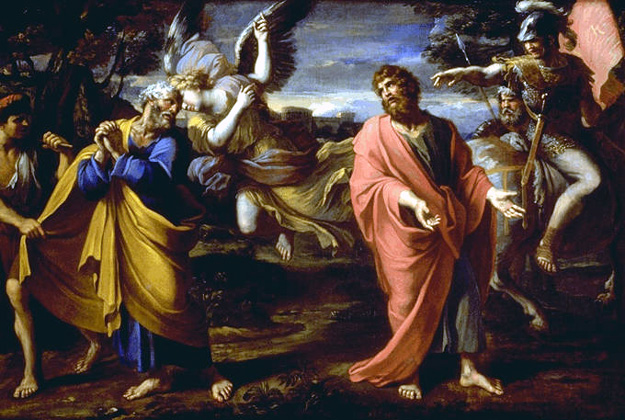
O holy apostles, Peter and Paul, I choose you this day and for ever to be my special patrons and advocates; thee, St. Peter, Prince of the Apostles, because thou art the Rock, upon which Almighty God hath built His Church; thee, St. Paul, because thou wast forechosen by God as the Vessel of election and the Preacher of truth in the whole world. Obtain for me, I pray you, lively faith, firm hope and burning love; complete detachment from myself, contempt of the world, patience in adversity, humility in prosperity, attention in prayer, purity of heart, a right intention in all my works, diligence in fulfilling the duties of my state of life, constancy in my resolutions, resignation to the will of God and perseverance in the grace of God even unto death; that so, by means of your intercession and your glorious merits, I may be able to overcome the temptations of the world, the flesh and the devil, and may be made worthy to appear before the chief and eternal Shepherd of souls, Jesus Christ, who with the Father and the Holy Ghost liveth and reigneth for endless ages, to enjoy His presence and love Him forever. Amen.
Our Father, Hail Mary, Glory be
V. Thous shalt make them princes over all the earth,
R. They shall be mindful of Thy Name, O Lord.
R. They shall be mindful of Thy Name, O Lord.
Let us pray
O God, whose right hand raised up blessed Peter, when he walked upon the water and began to sink, and thrice delivered his fellow-Apostle Paul from the depths of the sea, when he suffered shipwreck: graciously hear us and grant, by the merits of them both, that we also may attain unto everlasting glory: Who livest and reignest world without end. Amen.
Wednesday 20 June 2012
June 20 St. Silverius, Pope and Martyr
SILVERIUS was son of Pope Hormisdas, who had been engaged in wedlock before he entered the ministry. Upon the death of St. Agapetus, after a vacancy of forty-seven days, Silverius, being then subdeacon, was chosen pope, and ordained on the 8th of June, 536, Theodatus the Goth being king of Italy. Theodoric had bequeathed that kingdom to his grandson Athalaric, under the tuition of his mother Amalasunta, a most wise and learned princess. Athalaric died in 534, after a reign of eight years: when Amalasunta called Theodatus, a nephew of her father Theodoric by a sister, to the throne; but the ungrateful king, jealous of his power, caused her to be confined in an island in the lake of Bolsena, and there strangled in a bath before the end of the same year, 534. The shocking barbarity of this action encouraged the emperor Justinian to attempt the reduction of Italy. Belisarius, his general, had been successful in all his wars against rebels at home, the Persians in the East, and Gelimer the Vandal in Africa, whom he had brought prisoner to Constantinople in 534; by which victory he extinguished the puissant kingdom of the Vandals, and reunited Africa to the empire, after it had been separated above one hundred years. By the emperor’s order in 535, being then consul, he marched with his victorious army against Italy. He that year made himself master of Sicily, and passing thence into Italy in 536, took Naples. Upon which the Goths deposed Theodatus, and raised Vitiges, an experienced officer, to the throne. The senate and people of Rome, at the persuasion of Pope Silverius, opened the city to the imperialists, who entered by the Asinarian gate, whilst the Gothic garrison retired by the Flaminian towards Ravenna, where Vitiges had shut himself up. 
| 1 | ||
| Theodora, the empress, a violent and crafty woman, seeing Justinian now master of Rome, resolved to make use of that opportunity to promote the sect of the Acephali, or most rigid Eutychian, who rejected the council of Chalcedon, and also the Henoticon of Zeno, which Petrus Mongus, the Eutychian patriarch of Alexandria, had received, endeavouring in some degree to qualify that heresy. Anthimus, patriarch of Constantinople, was violently suspected of abetting the Acephali, and by the credit of the empress had been translated, against the canons, from the see of Trapezus or Trebisond to that of the imperial city. When Pope Agapetus came to Constantinople, in 536, he refused to communicate with Anthimus because he could never be brought to own in plain terms two natures in Christ; whereupon he was banished by Justinian; and St. Menas, an orthodox holy man, was ordained bishop of Constantinople by Pope Agapetus himself, who by a circular letter notified, that “the heretical bishop had been deposed by the apostolic authority, with the concurrence and aid of the most religious emperor.” This affair gave the empress great uneasiness, and she never ceased studying some method of recalling Anthimus, till the taking of Rome offered her a favourable opportunity of attempting to execute her design. Silverius being then in her power, she endeavoured to win him over to her interest, and wrote to him requiring that he would acknowledge Anthimus lawful bishop, or repair in person to Constantinople, and reexamine his cause on the spot. The good pope was sensible how dangerous a thing it was to oppose the favourite project of an empress of her violent temper, and said with a sigh in reading her letter, that this affair would in the end cost him his life. However he, without the least hesitation or delay, returned her a short answer, by which he peremptorily gave her to understand, that she must not flatter herself that he either could or would come into her unjust measures, and betray the cause of the Catholic faith. The empress saw from the firmness of his answer, that she could never expect from him any thing favourable to her impious designs, and from that moment resolved to compass his deposition. Vigilius, archdeacon of the Roman Church, a man of address, was then at Constantinople; whither he had attended the late pope Agapetus. To him the empress made her application, and finding him taken by the bait of ambition, promised to make him pope, and to bestow on him seven hundred pieces of gold, provided he would engage himself to condemn the council of Chalcedon, and receive to communion the three deposed Eutychian patriarchs, Anthimus of Constantinople, Severus of Antioch, and Theodosius of Alexandria. The unhappy Vigilius having assented to these conditions, the empress sent him to Rome, charged with a letter to Belisarius, commanding him to drive out Silverius, and to contrive the election of Vigilius to the pontificate. Belisarius was at first unwilling to have any hand in so unjust a proceeding; but after showing some reluctancy, he had the weakness to say: “The empress commands, I must therefore obey. He who seeks the ruin of Silverius shall answer for it at the last day; not I.” 2 Vigilius urged the general, on one side, to execute the project, and his wife Antonina on the other, she being the greatest confidant of the empress, and having no less an ascendant over her husband than Theodora had over Justinian. | 2 | ||
| The more easily to make this project to bear, the enemies of the good pope had recourse to a new stratagem, and impeached him for high treason. Vitiges the Goth returned from Ravenna in 537, with an army of one hundred and fifty thousand men, and invested the city of Rome. The siege lasted a year and nine days, during which both Goths and Romans performed prodigies of valour; but the latter defeated all the attempts and stratagems of the barbarians, and in the end obliged them to retire. The pope was accused of corresponding during the siege with the enemy, and a letter was produced, which was pretended to have been written by him to the king of the Goths, inviting him into the city, and promising to open the gates to him. Belisarius saw evidently this to be a barefaced calumny, and discovered the persons who had forged the said letter, namely, Marcus, a lawyer, and Julianus, a soldier of the guards, who had been both suborned by the pope’s enemies. The general, therefore, dropped this charge of treason, but entreated the pope to comply with the will of the empress, assuring him he had no other means of avoiding the loss of his see, and the utmost calamities. Silverius always declared that he could never condemn the council of Chalcedon, nor receive the Acephali to his communion. Upon leaving the general’s house, he fled for sanctuary to the basilic of the martyr St. Sabina; but a few days after, by an artful stratagem of Belisarius, was drawn thence, and summoned to repair to the Pincian palace, where the general resided during the siege. He was admitted alone, and his clergy, whom he left at the door, saw him no more. Antonina received him sitting upon her bed, whilst Belisarius was seated at her feet; she loaded him with reproaches, and immediately a subdeacon tore the pall off his shoulders. He was then carried into another room, stripped of all his pontifical ornaments, and clothed with the habit of a monk. After this it was proclaimed that the pope was deposed, and become a monk. Belisarius the next day caused Vigilius to be chosen pope, and he was ordained on the 22d of November, 537. In the mean time Silverius was conducted into banishment to Patara, in Lycia. The bishop of that city received the illustrious exile with all possible marks of honour and respect; and thinking himself bound to undertake his defence, soon after the pope’s arrival repaired to Constantinople, and having obtained a private audience, spoke boldly to the emperor, terrifying him with the threats of the divine judgments for the expulsion of a bishop of so great a see, telling him—“There are many kings in the world, but there is only one pope over the church of the whole world.” 3 It must be observed that these were the words of an oriental bishop, and a clear confession of the supremacy of the Roman see. Justinian, who had not been sufficiently apprized of the matter, appeared startled at the atrocity of the proceedings, and gave orders that Silverius should be sent back to Rome, and in case he was not convicted of the treasonable intelligence with the Goths, that he should be restored to his see; but if found guilty, should be removed to some other see. Belisarius and Vigilius were uneasy at this news, and foreseeing that if the order of the emperor were carried into execution, the consequence would necessarily be the restoration of Silverius to his dignity, they contrived to prevent it, and the pope was intercepted in his road towards Rome. His enemies saw themselves again masters of his person, and Antonina resolving at any rate to gratify the empress, prevailed with Belisarius to deliver up the pope to Vigilius, with full power to secure him as he should think fit. The ambitious rival put him into the hands of two of his officers, called the defenders of the church, who conveyed him into the little inhospitable island of Palmaria, now called Palmeruelo, over against Terracina, and near two other abandoned desert islands, the one called Pontia, now Ponza, and the other Pandataria, now Vento Tiene. In this place Silverius died in a short time of hard usage; Liberatus, from hearsay, tells us of hunger; but Procopius, a living witness, says he was murdered, at the instigation of Antonina, by one Eugenia, a woman devoted to their service. The death of Pope Silverius happened on the 20th of June, 538. Vigilius was an ambitious intruder and a schismatic so long as St. Silverius lived; but after his death became lawful pope by the ratification or consent of the Roman church, and from that time renounced the errors and commerce of the heretics. He afterwards suffered much for his steadfast adherence to the truth; and though he entered as a mercenary and a wolf, he became the support of the orthodox faith. | 3 | ||
| The providence of God in the protection of his church never appears more visible than when he suffers tyrants or scandals seemingly almost to overwhelm it. Then does he most miraculously interpose in its defence to show that nothing can make void his promises. Neither scandals nor persecutions can make his word fail, or overcome the church which he planted at so dear a rate. He will never suffer the devil to wrest out of his hands the inheritance which his Father gave him, and that kingdom which it cost him his most precious blood to establish, that his Father might always have true adorers on earth, by whom his name shall be for ever glorified. In the tenth century, by the power and intrigues of Marozia, wife to Guy, marquess of Tuscany, and her mother and sister, both called Theodora, three women of scandalous lives, several unworthy popes were intruded into the apostolic chair, and ignorance and scandals gained ground in some parts. Yet at that very time many churches were blessed with pastors of eminent sanctity, and many saints preached penance with wonderful success; nor did any considerable heresy arise in all that century. Pride, indeed, and a conceit of learning, are the usual source of that mischief. But this constant conservation of the church can only be ascribed to the singular protection of God, who watches over his church, that it never fail. | 4 |
Tuesday 12 June 2012
Casilda of Toledo
Saint Casilda of Toledo (Spanish: Santa Casilda de Toledo) (died ca. 1050 AD) is venerated as a saint of the Catholic Church. Her feast day is April 9.
According to her legend, St. Casilda, a daughter of a Muslim
her clothes to feed them.Once, she was stopped by
Muslim soldiers and asked to reveal what she was carrying
in her skirt. When she began to show them, the bread turned
she became ill as a young woman, she refused help from
not far from the miraculous
spring. It is said that she lived to be 100 years old.
 [edit]
[edit]
Sunday 10 June 2012
June 13: Saint Anthony of Padua, Doctor of the Church
Loving God, upon this day
Sing we all in joyful praise:
Anthony, your faithful son,
On this day has heaven won.
He, the preacher of the Word,
Lived in deed the truth he heard;
Called by martyr's death to be
Vowed to holy poverty.
Lord, accept the hymns we raise,
Singing Anthony's holy praise!
Faithful friar, in Francis' step
Bids us go where he has led,
Drawn by him, we offer laud
To Christ Jesus, Son of God.
Fearless teacher of the way,
Guiding us to work and pray,
Through his never-ceasing prayer
Leads us Christ-ward ev'rywhere.
Lord, accept the hymns we raise,
Singing Anthony's holy praise!
To the Father and the Son
And the Spirit, Three-in-One,
Hymns of glory, songs of love
Sing we, echoing those above.
With the angels' chorus high
Earth now makes this joyful cry;
With Saint Anthony we sing,
Praising God, our heav'nly King.
Lord, accept the hymns we raise,
Singing Anthony's holy praise!
(J. Michael Thompson)
On June 13, we celebrate the feast of Saint Anthony of Padua(1195-1231), Doctor of the Church, Confessor, Franciscan friar, and patron saint of lost items, travelers, and the poor. Saint Anthony’s life is one of preaching, writing, and prayer. He was canonized less than one year after his death, demonstrating the respect and veneration the Church held him in. In canonizing Anthony in 1232, Pope Gregory IX spoke of him as the “Ark of the Testament” and the “Repository of Holy Scripture.” In 1946 Pope Pius XII officially declared Anthony a Doctor of the Universal Church. Based upon his unending love for the Lord, the Church wants us to learn from Saint Anthony the meaning of true wisdom and what it means to become like Jesus, who humbled himself for us and served others without hesitation. Saint Anthony of Padua remains one of the most beloved and admired saints of the Church.
Saint Anthony was born Fernando Martin de Bulhom, in Lisbon, Portugal (not Padua, as is frequently assumed). Born into the royal court of King Alfonso II, as his father was a knight, he was afforded the best in education and living available at the time. His parents sent him to the Cathedral of Lisbon, where he was educated in both scholarly and spiritual matters by the clergy. By the age of 15, he had joined the Canons Regular of Saint Augustine. At age 17, he requested and received a transfer to the priory of Saint Cross (in Coimbra, Portugal), where he would be afforded more solitude and contemplative silence. There, he spent eight years in silent prayer and devotion, living and breathing the Scriptures.
At 25, Saint Anthony was led to join the Franciscan Order (at which time he took the name Anthony in honor of Saint Antony of Egypt). Deeply inspired by the history of Franciscan martyrs, he strove to emulate the sacrifice of those who preceded him. He requested permission to journey to Africa on mission, and was granted approval, but became so ill upon arrival was forced to reboard his ship and return to Portugal.
En route home, a storm forced the ship to land off the cost of Sicily, where Anthony was housed by the Franciscans who lived there. He journeyed to Assisi, and served as chaplain to the hermits, performing the most menial of tasks, and practicing penance and mortification.
It was there, when forced via obedience to his superior to preach, that the Holy Spirit shone forth from Saint Anthony, and he earned a reputation for eloquence and ability. Saint Francis, who heard of the event, prescribed that Anthony preach throughout Italy, and later to teach theology to the brethren. Francis instructed that Anthony teach “in such a manner that the spirit of prayer be not extinguished either in yourself or in the other brethren." Anthony continued to preach despite his busy teaching schedule, striving constantly for the salvation of souls.
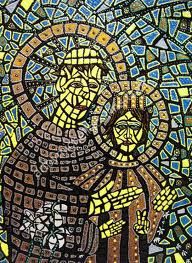 Saint Anthony’s sermons attracted large numbers of people—so many, that no church would accommodate the crowds. He took to preaching outside, and even in the rain, his listeners would remain miraculously dry and protected from the elements. Following preaching, he would hear confessions throughout the night, sleeping little, but unable to turn from those in spiritual need.
Saint Anthony’s sermons attracted large numbers of people—so many, that no church would accommodate the crowds. He took to preaching outside, and even in the rain, his listeners would remain miraculously dry and protected from the elements. Following preaching, he would hear confessions throughout the night, sleeping little, but unable to turn from those in spiritual need.Saint Anthony was eventually elected Minister Provincial of the friars, and maintained his fasting and penance. Eventually, he felt his strength waning, and prepared himself for death. After receiving the last sacraments he kept looking upward with a smile. When he was asked what he saw there, he answered: "I see my Lord." Anthony died at the young age of 36, to the cries of children in the street: "The saint is dead, Antony is dead."
Anthony’s body was buried in the Franciscan Church of Saint Mary in Padua (from which his name originates). Canonized within the year, a grand basilica was built only 30 years later, and his relics placed beneath the alter. Upon translation of his holy relics, it was found that his body had been reduced to dust and bone, but that his tongue was incorrupt—intact and life-like. This was taken as confirmation of his gifts of writing, preaching, and teaching from the Lord. St. Bonaventure, who was present as minister general of the Friars Minor, took the tongue reverently into his hands and exclaimed,
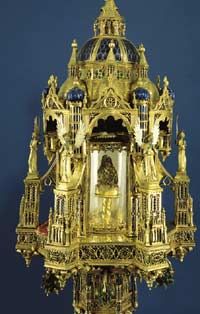 |
| Reliquery of Saint Anthony's Tongue |
Saint Anthony’s tongue was placed in a reliquary, and is still venerated today. From his death until the present day, numerous miracles have been reported at his intercession.
Saint Anthony’s teaching of the Catholic faith was simple and uncluttered, appealing to all, and understood by any who listened. He valiantly fought heresies by calling upon the Holy Name of Mary. When he found that he was preaching the true Gospel of the Catholic Church to heretics who would not listen to him, he went out and preached it to the fishes (in the process attracting a large crowd). This was for the glory of God, the delight of the angels, and the easing of his own heart. St. Anthony wanted to profess the Catholic Faith with his mind and his heart, at every moment.
Select Quotations of Saint Anthony of Padua:
"The saints are like the stars. In his providence Christ conceals them in a hidden place that they may not shine before others when they might wish to do so. Yet they are always ready to exchange the quiet of contemplation for the works of mercy as soon as they perceive in their heart the invitation of Christ."
“Actions speak louder than words; let your words teach and your actions speak. We are full of words but empty of actions, and therefore are cursed by the Lord, since he himself cursed the fig tree when he found no fruit but only leaves. It is useless for a man to flaunt his knowledge of the law if he undermines its teaching by his actions.
But the apostles “spoke as the Spirit gave them the gift of speech.” Happy the man whose words issue from the Holy Spirit and not from himself!
We should speak, then, as the Holy Spirit gives us the gift of speech. Our humble and sincere request to the Spirit for ourselves should be that we may bring the day of Pentecost to fulfillment, insofar as he infuses us with his grace, by using our bodily senses in a perfect manner by keeping the commandments. Likewise we shall request that we may be filled with a keen sense of sorrow and with fiery tongues for confessing the faith so our deserved reward may be to stand in the blazing splendor of the saints and to look upon the triune God.”
"Attribute to God every good that you have received. If you take credit for something that does not belong to you, you will be guilty of theft."
"The life of the body is the soul; the life of the soul is God."
"These symbolize (Proverbs 30:14) the greedy and usurers whose teeth are swords and knifes which they use to devour the poor and steal their meager possessions. All of them are children of this world who consider the children of light to be stupid and believe themselves to be the prudent ones. Their prudence is their death."
"Christ acts like a loving mother. To induce us to follow Him, He gives us Himself as an example and promises us a reward in His kingdom."
"The Glorious Virgin did not have a stain in her birth because she was sanctified in her mother's womb and safeguarded there by angels."
"The spirit of humility is sweeter than honey, and those who nourish themselves with this honey produce sweet fruit."
"Solicitude for material things distracts the soul and divides it. The devil seizes the divided soul and drags it to hell."
"Christians must lean on the Cross of Christ just as travelers lean on a staff when they begin a long journey. They must have the Passion of Christ deeply embedded in their minds and hearts, because only from it can they derive peace, grace, and truth."
Saint Anthony’s Blessing
Behold, the Cross of the Lord! Begone, all evil powers! The Lion of the tribe of Judah, The Root of David, has conquered! Alleluia, Alleluia!
Prayer for the Help of the Holy Spirit (Written by Saint Anthony of Padua)
O God, send forth your Holy Spirit into my heart that I may perceive, into my mind that I may remember, and into my soul that I may meditate. Inspire me to speak with piety, holiness, tenderness and mercy. Teach, guide and direct my thoughts and senses from beginning to end. May your grace ever help and correct me, and may I be strengthened now with wisdom from on high, for the sake of your infinite mercy. Amen.
O God, who by thy Holy Spirit didst give to thy servant Antony a love of the Holy Scriptures, and the gift of expounding them with learning and eloquence, that thereby thy people might be established in sound doctrine and encouraged in the way of righteousness, grant to us always an abundance of such preachers, to the glory of thy Name and the benefit of thy Church; through Jesus Christ our Lord, who liveth and reigneth with thee and the Holy Spirit, one God, now and for ever. Amen.
Wednesday 6 June 2012
Zaragoza:Our Lady of the Pillar
In the cathedral, Northeastern Spain, 39 cm, wood on 6 ft jasper pillar, encased in silver and gold.
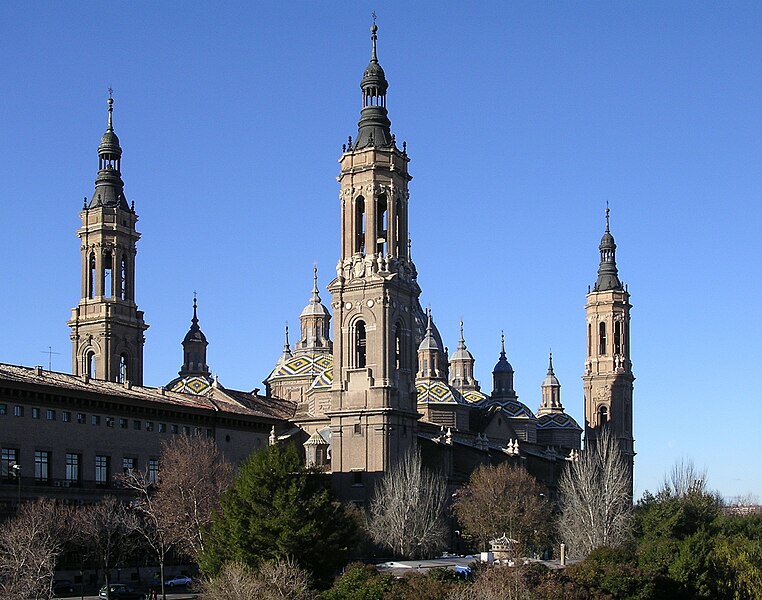 |  | ||
One may wonder why Mary gave James such a big pillar on which to place a small statue. What is the significance of the pillar? The Hebrew word for pillar also means memorial stone. Since the time of the Jewish patriarchs, pillars mark places of special importance that are to be commemorated by future generations. But pillars or 'sacred poles' were also an ancient Jewish symbol for the feminine face of God. They represented the Tree of Life, which in turn was the image and title of the Canaanite Goddess Asherah. Lady Wisdom, the feminine aspect or companion of God described in the Old Testament, is also called Tree of Life (Proverbs 3:18). The Bible acknowledges that a sacred pillar was placed in Salomon's temple in Jerusalem and poles in other holy places to embody the feminine face of God. The pillar was near the Ark of the Covenant, so that the God (who speaks of itself in the plural and created humans in its image as male and female (Genesis 1:27)) would not miss its female side. But around 622 B.C. King Josiah reigned and since he didn't distinguish between good and bad pagan influences he destroyed everything he considered pagan. (2 Kings 23:6 + 14) It seems that centuries after he pulverized all the goddess poles of the Jews, Heaven itself brought the sacred pillar of the Heavenly Mother and the Tree of Life (also one of Mary's titles) back into Christian temples. God seems to prophesy to this in Revelation 3:12 when he says: "The victor I will make into a pillar in the temple of my God and he (or she) will never leave it again." After this first apparition of Mary, the Apostle James built the first chapel dedicated to the Blessed Virgin. She answered many prayers with miracles and so the conversion of Spain succeeded. Although the chapel was later destroyed, as were several other churches on the spot, the statue and its pillar have endured over the millennia and stand to this day in a magnificent basilica. __________________________________________________________________ | |||
Subscribe to:
Posts (Atom)










